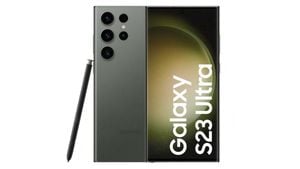Tom Hanks has ignited controversy following his portrayal of a Donald Trump supporter during the 50th anniversary special of Saturday Night Live (SNL). The actor reprised his popular character Doug during the show’s 'Black Jeopardy!' sketch, showcasing the tensions and humor surrounding political stereotypes.
Viewers were greeted with Hanks donning the iconic red 'Make America Great Again' (MAGA) cap and exhibiting the mannerisms of Doug, who is depicted as oblivious yet somewhat endearing. This heightened drama reached its peak as Hanks's character recoiled from the handshake offered by the sketch's host, played by Kenan Thompson, leading to widespread outrage from segments of the audience.
Critics took to social media, expressing their discontent and claiming the sketch perpetuated harmful stereotypes of Trump supporters. Notably, conservative voices, including former SNL cast member Victoria Jackson, voiced strong condemnations. Speaking to TMZ, Jackson described the sketch as 'stupid,' calling attention to the show's tendency to label MAGA supporters unfairly.
Jackson expressed, 'This show wonders why their ratings are in the gutter. Trump won the popular vote. This tired trope is disgusting,' highlighting the disconnect between the perception of Trump supporters and reality. Her comments echoed sentiments shared by other critics who insisted the sketch was not only unfunny but also reflected the elitism often attributed to Hollywood.
Joy Behar, well-known for her role on The View, offered another perspective during the show's discussion about the backlash. While agreeing there was validity to the outrage, she emphasized the complexity behind the motivations of many Trump voters. 'I personally would never do [the sketch], because I don’t believe any group is one thing,' she noted. Behar elaborated on her view, asserting many voters had been misled to believe prices would decrease and entitlements were secure.
Sunny Hostin joined the discussion, stating, 'I think it’s very subversive; it’s about Black culture being American culture.' Hanks's portrayal, she explained, harked back to earlier skits and attempted to capture the nuanced intersections of race and politics within America.
Adding to the conversation, Alyssa Farah Griffin, another cohost on The View and former White House Director of Strategic Communications under Trump’s first term, described the outrage as somewhat exaggerated. Griffin maintained, 'SNL' has often pushed boundaries with humor and it’s important to view these sketches through the lens of comedy rather than political critique.
On social media, reactions ranged from criticism to reinforcement of the stereotypes presented. Notable political commentator Mario Newfal expressed frustration, pointing out, 'Hollywood still doesn't get it. Portraying Trump supporters as racist caricatures…' Hanks’s skit was described by many viewers as outdated and out of touch with the shifting political landscapes, particularly as Trump has allegedly garnered support from diverse communities.
Commentator Alexandra Lains urged restraint, noting, 'America was not built on the approval of celebrities,' ironically adding fuel to the discontent directed at Hanks. Among the critiques, many users reinforced Hanks's position, questioning why they should allow actors to shape their emotional responses.
Not only did the backlash become personal for Hanks, but it also exposed fissures within the conservative audience. Criticisms over perceived insensitivity began to connect Hanks’s set pieces to wider discussions about race and identity politics. Videos from the 'Black Jeopardy!' skit accumulated millions of views on X platform, where conservatives presented their case against Hanks's portrayal.
Further amplifying the discussion was Meghan McCain, daughter of the late Senator John McCain, who took to X, accusing Hanks of being 'as hate-mongering of regular Americans as any host on MSNBC.' Her critique emphasized how Hanks's image contrasts with the everyman persona he has cultivated over his extensive career.
Hanks, who is closely associated with Democratic figures like Barack Obama and was instrumental during Joe Biden's inauguration celebration, now finds himself ensnared within the web of contemporary political discourse deeply interwoven with celebrity culture.
Link Lauren, former Robert F. Kennedy Jr. aide, also weighed in, criticizing the sketch's racial undertones and reinforcing the narrative of disdain, writing, 'This tired trope is disgusting— SNL is unfunny for snobbish liberal elites.' The backlash from MAGA fans, including the notion of 'SNL’s declining viewership,' showcased how the sketch affected not only perceptions of Hanks but also broader Hollywood narratives.
Reflecting on the nature of the sketch, the mixed responses shed light on the divide between perceptions of humor and its reception by politically defined groups. Many have started questioning whether SNL can continue delivering comedic commentary on sensitive topics genuinely without alienation.
While Hanks has enjoyed substantial success as one of America’s beloved film stars, this backlash indicates the delicate terrain actors tread when addressing polarizing political themes. This incident underlines the risks associated with creatively depicting divisive characters and themes, particularly within the surreal world of sketch comedy.
Tom Hanks’s SNL performance and the reactions it sparked serve as reminders of the enduring rift within American politics—one where humor can be both illuminating and incendiary. Hence, the interaction between public figures and their portrayal becomes ever more pressing as the nation grapples with its identity.



